Senate Bill Proposes Statewide Solution To Coal Ash Problem

The Vermilion Power Station operated from 1955 to 2001, when it was retired by Dynegy Midwest Generation. Jack Brighton/Illinois Public Media
Senate Bill 9, the Coal Ash Pollution Prevention Act, would require that the state adopt federally enforceable safeguards on the storage, care and closure of “surface impoundments,” which are large ponds where waste from coal power plants is disposed.
State Sen. Scott Bennett, D-Champaign, introduced the bill, which passed the Illinois Senate on Thursday.
Portions of Bennett’s district include Vermillion County, where coal ash ponds from the retired Vermilion Power Station threaten to contaminate groundwater and the nearby Middle Fork of the Vermillion River. The Illinois EPA has issued two violation notices to Dynegy Midwest Generation for pollution of groundwater and surface water from its three coal ash ponds near the plant.
“Frankly the power companies have a really unfair advantage,” Bennett said. “That’s why it’s so important to get a state law passed so it’s not going to be just a regional thing, but we have one approach for the whole state. And I think we get that with Senate Bill 9.”
Bennett says the bill would also ensure the safe closure of the dozens of other coal ash impoundments left behind by power plants in the state by requiring the Environmental Protection Agency approve protective closure plans.
“They’re all over the state, and it’s not just one district’s problem,” Bennett said. “I wanted to make sure that other districts, as they go through and try to close these pits, don’t go through the same thing that we went through in Vermillion County.”
Coal ash is one of the largest types of industrial waste generated in the U.S., according to the EPA. It contains a toxic mix of contaminants, which can include heavy metals like mercury, arsenic and selenium. These byproducts from coal-fired power plants can pose risks to wildlife and human health if they’re not properly disposed of.
Senate Bill 9 passed the Illinois Senate with 39 votes. It now moves to the House of Representatives for consideration.
Links
- Bipartisan Illinois House Resolution Calls for Coal Ash Task Force
- Illinois EPA Seeks Public Input On Dynegy Plan To Stabilize the Middle Fork Near Coal Ash Ponds
- Illinois EPA Hearing On Middle Fork Stabilization Plan Shows Extent Of Public Opposition
- What To Know About Tuesday’s Public Hearing On Dynegy’s Middle Fork Stabilization Proposal
- Public Comments Open On Dynegy Plan To Stabilize Middle Fork River
- U.S. District Court Dismisses Lawsuit Against Dynegy For Polluting The Middle Fork
